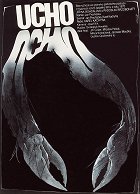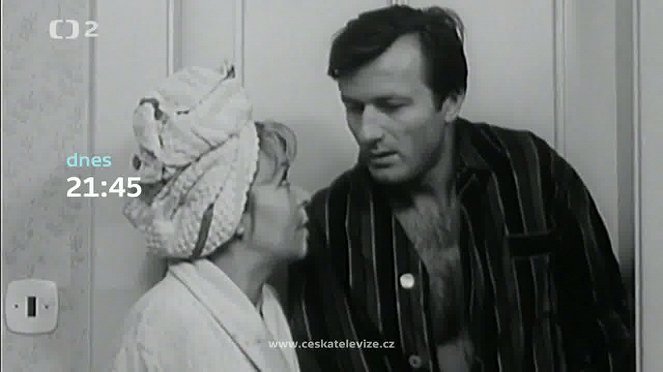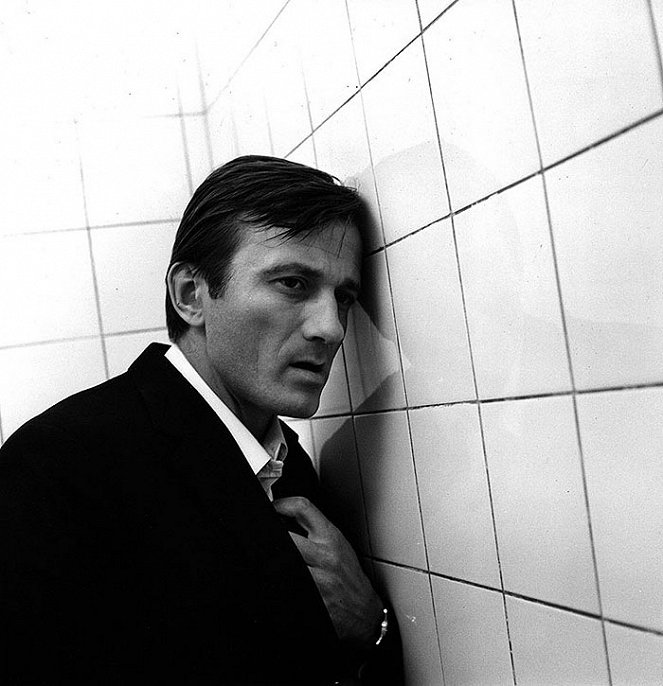Director:
Karel KachyňaCámara:
Josef IllíkMúsica:
Svatopluk HavelkaReparto:
Jiřina Bohdalová, Radoslav Brzobohatý, Gustav Opočenský, Miloslav Holub, Lubor Tokoš, Bořivoj Navrátil, Jiří Císler, Jaroslav Moučka, Karel Vašíček (más)Sinopsis(1)
In the midst of a July night, sometimes in the 1950s, deputy minister Ludvík and his wife Anna return home from a governmental reception. The woman is drunk, feels offended that the husband forgot about the tenth anniversary of their marriage, and keeps gibing, trying to stir a quarrel. In front of their villa, they cannot find the keys. As Ludvík climbs over the gate, Anna finds out it is unlocked and discovers other strange things. Electricity and phone in the house are cut off and there are some strange men moving around in their garden. Ludvík recalls the discussions at the reception where he learned that his superior minister and several other men were arrested. Horror begins to seize him as he realizes that he himself helped to write a critical report on brickyards, which was possibly the cause of the arrest. He begins to destroy documents, tearing some, flushing others down the toilet and burning yet more. The tense situation results in a fight between the husband and wife, with Anna reproaching Ludvík for his unscrupulous careerism. Then a group of secret policemen rings the bell by the gate. Anna prepares things for Ludvík to take to prison. However, the agents did not come to arrest him and Ludvík, out of gratitude, plays host to them. When the men leave, the couple finds out that they "only" came to complete installation of a monitoring system, having been interrupted by Ludvík's and Anna's preliminary arrival. It is morning, the husband and wife, exhausted by fear and stirred emotions, are having breakfast. The phone rings and Ludvík is told he has been appointed minister. (texto oficial de la distribuidora)
(más)Videos (2)
Reseñas (8)
Probably the best film showing the communist 1950s not as an exhilarated working class era, but as a time full of fear and widespread snitching. Brzobohatý as a high-ranking communist official and Bohadalová as his wife give the performances of a lifetime. After the Russian occupation this film went into the vaults, of course. Kachyňa made a humiliating apology and survived, but Jan Procházka, with his script, set up his professional suicide.
()
Kachyňa's formal austerity (changing only two locations, Illík's static camera) is a glove thrown down to the central acting tandem, who lifted it more than worthily. You don’t see this sort of riveting acting concert, based on Jan Procházka's brilliantly written book, very often. The paranoia of the times, the fickleness of the political parties of the communist regime, and last but not least the cracks of a ten-year marriage served up in one endless night. Thirty years ago, the film was an unsavory reflection of the times for the comrades, today it is an index finger raised in warning that deserves more than just a screening in club cinemas!
()
All kidding aside. It is indeed sympathetic that to this day Bohdalová can still bow to Procházka, but was there really only one film that was worth so much that she would throw away her entire previous career for it? The Ear soon became the reason for her varied efforts in film (since 1937) with considerable results, and she quickly turned into a stereotypical constant on the television screen. Later, she did try to return to the big screen, but the small amount from the 1990s can never make up for the wasted two decades in which she could have fully capitalized on her mature acting. Brzobohatý and Kachyňa were of course lucky in their misfortune, as they continued on much more smoothly...
()
Extraordinary film by Karel Kachyna, which the director had to iron out with the authorities for a long time, while the film went straight into the vault. Top-notch screenplay that perfectly captures the essence of the era and regime, superbly crafted atmosphere that builds up to the final scene. Excellent cast led by Brzobohatý and Bohdalová, simply unique, although somewhat oppressive experience. This is not a movie for pleasant entertainment, but rather a heavy nightmare of our recent history. Overall impression: 100%.
()
This story never happened. The things that really happened were much worse (as Jan Procházka noted in his screenplay). “The most banned of the banned" or another busy night for the Minister’s private secretary. A thick atmosphere hand in hand with incredible tension-rise. A psycho(logical) portrait of life in Czechoslovakia in the nineteen fifties (i.e. during the Stalinist period). Kachyňa’s best ever picture. Those are the main ingredients of the best Czechoslovak movie about the impacts of Communism on regular people.
()



Anuncio